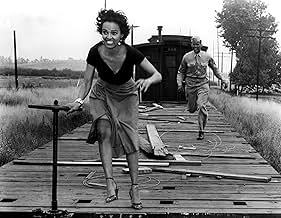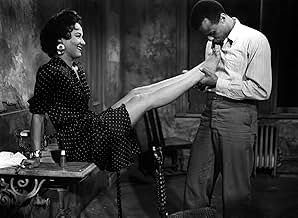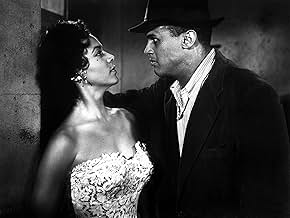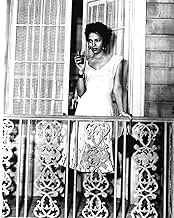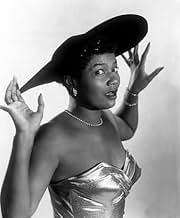VALUTAZIONE IMDb
6,8/10
6227
LA TUA VALUTAZIONE
Aggiungi una trama nella tua linguaContemporary version of the Bizet opera, with new lyrics and an African-American cast.Contemporary version of the Bizet opera, with new lyrics and an African-American cast.Contemporary version of the Bizet opera, with new lyrics and an African-American cast.
- Regia
- Sceneggiatura
- Star
- Candidato a 2 Oscar
- 6 vittorie e 8 candidature totali
Brock Peters
- Sergeant Brown
- (as Broc Peters)
LeVern Hutcherson
- Joe
- (voce)
- (as Le Vern Hutcherson)
Marilyn Horne
- Carmen Jones
- (voce)
- (as Marilynn Horne)
Marvin Hayes
- Husky Miller
- (voce)
Alvin Ailey
- Dance Soloist
- (non citato nei titoli originali)
DeForest Covan
- Trainer
- (non citato nei titoli originali)
Joseph E. Crawford
- Dink Franklin
- (voce (canto))
- (non citato nei titoli originali)
Carmen De Lavallade
- Dance Soloist
- (non citato nei titoli originali)
Bernie Hamilton
- Reporter
- (non citato nei titoli originali)
Margaret Lancaster
- Singing Voice
- (non citato nei titoli originali)
Recensioni in evidenza
Some greatness here. Dandridge's performance is riveting, and Pearl Bailey is a wonderful addition. Bizet's music is as appealing as always. The singers are excellent. The dancers at Billy Pastor's are another high point.
Too many slips for me to rate it a 10. It's lip-synced -- like every other movie musical, and (despite what one other reviewer said), one of the best lip-sync jobs I've seen. Only My Fair Lady does better (of those I've seen). Dandridge, Belafonte, and Bailey are particularly good; Olga James much less so. But I always find lip-syncing painfully obvious and distracting and will probably never have a chance to top-rate a movie musical as a result. It's also quite distracting when Joe breaks into song, because LeVern Hutcherson's voice is so different from Harry Belafonte's. It's a real shame that experienced singers like Dandridge and Belafonte weren't allowed to sing. Marilyn Horne, wow -- but I like the voice to match the face.
The acting is uneven. Some is excellent, led by Dandridge, and others do well too. But some of the acting is stiff.
Then there's the re-setting. Oh, moving the place is fine. It's funny that a couple of reviewers have referred to "how the Spaniards do it" and "Spanish opera". Hey, Carmen is set in Seville and Bizet attempted to use some Spanish musical idioms, but Carmen is a French opera through and through. Bizet was French, Prosper Merimee was French, the libretto is in French. But Carmen Jones only uses the top arias from Carmen, and ends up adding a lot of dialog to fill in the time. The story is true to the original, but Bizet told more in music and Hammerstein tells more in words. Oscar should have trusted Georges more.
I notice that Alvin Ailey is uncredited as a dancer. I found a couple of photos of him on the web -- it's hard, because his dance company has been so much more famous than the man, but I found a couple. I *think* I figured out which one he is -- some slo-mo work there -- but most of the dancers' faces don't come into focus for long enough to know for sure. It would be mostly a curiosity to know, since the movie doesn't show enough of the dance to see any personal style.
Too many slips for me to rate it a 10. It's lip-synced -- like every other movie musical, and (despite what one other reviewer said), one of the best lip-sync jobs I've seen. Only My Fair Lady does better (of those I've seen). Dandridge, Belafonte, and Bailey are particularly good; Olga James much less so. But I always find lip-syncing painfully obvious and distracting and will probably never have a chance to top-rate a movie musical as a result. It's also quite distracting when Joe breaks into song, because LeVern Hutcherson's voice is so different from Harry Belafonte's. It's a real shame that experienced singers like Dandridge and Belafonte weren't allowed to sing. Marilyn Horne, wow -- but I like the voice to match the face.
The acting is uneven. Some is excellent, led by Dandridge, and others do well too. But some of the acting is stiff.
Then there's the re-setting. Oh, moving the place is fine. It's funny that a couple of reviewers have referred to "how the Spaniards do it" and "Spanish opera". Hey, Carmen is set in Seville and Bizet attempted to use some Spanish musical idioms, but Carmen is a French opera through and through. Bizet was French, Prosper Merimee was French, the libretto is in French. But Carmen Jones only uses the top arias from Carmen, and ends up adding a lot of dialog to fill in the time. The story is true to the original, but Bizet told more in music and Hammerstein tells more in words. Oscar should have trusted Georges more.
I notice that Alvin Ailey is uncredited as a dancer. I found a couple of photos of him on the web -- it's hard, because his dance company has been so much more famous than the man, but I found a couple. I *think* I figured out which one he is -- some slo-mo work there -- but most of the dancers' faces don't come into focus for long enough to know for sure. It would be mostly a curiosity to know, since the movie doesn't show enough of the dance to see any personal style.
Even after the success of Oklahoma, the partnership of Rodgers&Hammerstein was not cast in stone yet. After Oklahoma debuted, Oscar Hammerstein, II went to work on his next Broadway show with a dead collaborator. He wrote new lyrics for the music of Georges Bizet's opera Carmen and wrote a new book for an all black cast to perform it, in the tradition of Porgy and Bess.
That show was Carmen Jones and it ran for 502 performances on Broadway from 1943 to 1945. Hammerstein discovered what the team of Robert Wright and Chet Forrest had previously found out in adapting Edvard Grieg's melodies into their hit, Strange Music. That there's nothing like writing with a collaborator who can't complain and who's melodies are already a hit.
In fact while the show was originally on Broadway, Rise Stevens had sung in Going My Way the song that eventually became Dat's Love. And Nelson Eddy and sung The Toreador Song in his film Balalaika. Hammerstein brilliantly capitalized on some free publicity for his own show.
Harry Belafonte and Dorothy Dandridge give great acting performances though it's kind of strange to hear other voices coming from the mouths of two good singers. Their voices weren't operatic though, yet the singers dubbing them matched well with the personalities of both the leads. And Dandridge had Marilyn Horne, you can't do much better than that.
The whole thing originates from the French novelist's Prosper Merimee's story of the ill effects of passionate love. Harry Belefonte's on his way to being a Tuskegee airman and he runs afoul of Carmen Jones. Belefonte's got himself a gal, but Dandridge puts on her Delilah routine and Belefonte's dead meat.
In addition to Samson and Delilah the Belefonte character is remarkably similar to George Hurstwood in Theodore Dreiser's Sister Carrie. Another man who threw it all away for passion. I wouldn't be surprised if Dreiser refined Merimee's theme.
But Dandridge's performance is the best. As the hedonistic Carmen Jones, she's a wonder on screen. Seeing her realize that part on the screen, we can well understand why Belefonte threw it all away for love. Dandridge became the first black woman nominated in the Best Actress category, but she lost the Oscar sweepstakes to Grace Kelly for The Country Girl.
For those who like the opera Carmen, I think they'll be well pleased with Oscar Hammerstein, II did with Bizet's music and Merimee's story.
That show was Carmen Jones and it ran for 502 performances on Broadway from 1943 to 1945. Hammerstein discovered what the team of Robert Wright and Chet Forrest had previously found out in adapting Edvard Grieg's melodies into their hit, Strange Music. That there's nothing like writing with a collaborator who can't complain and who's melodies are already a hit.
In fact while the show was originally on Broadway, Rise Stevens had sung in Going My Way the song that eventually became Dat's Love. And Nelson Eddy and sung The Toreador Song in his film Balalaika. Hammerstein brilliantly capitalized on some free publicity for his own show.
Harry Belafonte and Dorothy Dandridge give great acting performances though it's kind of strange to hear other voices coming from the mouths of two good singers. Their voices weren't operatic though, yet the singers dubbing them matched well with the personalities of both the leads. And Dandridge had Marilyn Horne, you can't do much better than that.
The whole thing originates from the French novelist's Prosper Merimee's story of the ill effects of passionate love. Harry Belefonte's on his way to being a Tuskegee airman and he runs afoul of Carmen Jones. Belefonte's got himself a gal, but Dandridge puts on her Delilah routine and Belefonte's dead meat.
In addition to Samson and Delilah the Belefonte character is remarkably similar to George Hurstwood in Theodore Dreiser's Sister Carrie. Another man who threw it all away for passion. I wouldn't be surprised if Dreiser refined Merimee's theme.
But Dandridge's performance is the best. As the hedonistic Carmen Jones, she's a wonder on screen. Seeing her realize that part on the screen, we can well understand why Belefonte threw it all away for love. Dandridge became the first black woman nominated in the Best Actress category, but she lost the Oscar sweepstakes to Grace Kelly for The Country Girl.
For those who like the opera Carmen, I think they'll be well pleased with Oscar Hammerstein, II did with Bizet's music and Merimee's story.
to see this amazing film. I thought Halle Berry did a great job in the Dandridge biopic, but after seeing Carmen Jones I don't know if she could do Dorothy justice. This woman was amazing in this film. she RADIATED sex appeal and I could see why her performance was groundbreaking. Otto Preminger directed and shot a beautiful film, and contemporary actors, especially black actors, should set the performances in this movie as highwater marks to shoot for. Pearl Bailey was amazing in addition to the two leads, Belafonte and Dandridge. Joe Adams as the boxer and the woman who played Cindy Lou also gave great performance.
Again to see black actors in this time period given a chance to perform a full range of characters was really amazing. In a lot of ways this film is more progressive than the drivel of black genre films coming out of Hollywood today
Again to see black actors in this time period given a chance to perform a full range of characters was really amazing. In a lot of ways this film is more progressive than the drivel of black genre films coming out of Hollywood today
This memorable melodrama is an interesting adaptation of the classic "Carmen" story and music with a new setting and new song lyrics. Most of it works quite well, but it is remembered most of all for Dorothy Dandridge's impressive performance as "Carmen Jones".
The basic Carmen story itself is a perceptive and tragic look at the elemental passions and emotions that drive so much of what happens in human relationships. For the story to work most effectively, it takes a Carmen who not only has plenty of energy, but who also can be convincing in dominating all of the other characters. Dandridge excels at both, and she makes it easy to believe that she could get practically anything that she wanted from anyone.
Except for Pearl Bailey, who makes her character lively and entertaining in her own right, most of the rest of the cast is solid but is clearly - as is no doubt meant to be the case - overshadowed by Dandridge and Carmen. One exception, though, is Olga James as Cindy Lou. Although her character is very meek, and has no chance against Carmen, James does a fine job of making her sympathetic without becoming overly weepy or maudlin, and her performance adds some additional depth to the drama of relationships.
Most of the musical numbers work well, and there is good variety in them, as there is also in the settings and the material. The climactic sequence in the arena is nicely crafted, with the prizefight taking place in full view while, hidden from sight, the characters' passions are reaching the boiling point. It caps off an effective and interesting movie.
The basic Carmen story itself is a perceptive and tragic look at the elemental passions and emotions that drive so much of what happens in human relationships. For the story to work most effectively, it takes a Carmen who not only has plenty of energy, but who also can be convincing in dominating all of the other characters. Dandridge excels at both, and she makes it easy to believe that she could get practically anything that she wanted from anyone.
Except for Pearl Bailey, who makes her character lively and entertaining in her own right, most of the rest of the cast is solid but is clearly - as is no doubt meant to be the case - overshadowed by Dandridge and Carmen. One exception, though, is Olga James as Cindy Lou. Although her character is very meek, and has no chance against Carmen, James does a fine job of making her sympathetic without becoming overly weepy or maudlin, and her performance adds some additional depth to the drama of relationships.
Most of the musical numbers work well, and there is good variety in them, as there is also in the settings and the material. The climactic sequence in the arena is nicely crafted, with the prizefight taking place in full view while, hidden from sight, the characters' passions are reaching the boiling point. It caps off an effective and interesting movie.
You may guess that I love Bizet's opera Carmen, it is somewhat tragic but very passionate. While updated, this film directed wonderfully by the talented Otto Preminger is a wonderful contemporary version of the opera, still maintaining Bizet's wonderful music and inspired lyrics from Oscar Hammerstein II. Whether it is the definitive film version of the opera I am not sure, I absolutely adore the 1984 film with Placido Domingo and Julia Mignes-Johnson. That aside, this film is really handsomely shot, with beautiful crisp cinematography and stunning scenery. And of course the music is outstanding "Dat's Love", "Dis Flower", "Stan' Up an' Fight" and "Dere's a Cafe on de Corner" really do stand out. The story is a beautiful, tragic, compelling one, not at all confusing. And the performances are marvellous, Dorothy Dandridge is superb as Carmen Jones. She is gorgeous, flirtatious and sexy, everything Carmen in the opera should be. Harry Belafonte does a great job as Joe, the man consumed for the passion of Carmen, so much so he is driven to murder. Olga James is heart breaking as Cindy-Lou, Pearl Bailey is a delightful Frankie, Joe Adams is a great Husky Miller and Brock Peters is effective as Sergeant Brown. I have heard complaints that the singing was awful, and I disagree completely. Marilyn Horne has a beautiful singing voice and she did well as Carmen. She has been better though, she has a much stronger voice than what was heard here. And LeeVern Hutcherson has a lovely tenor voice, quite lightweight and sensitive when it needs to be. And Marvin Hayes has a very resonant voice that is needed for his character. If the singing was a little quiet at times, do bear in mind sound and technology wasn't as good then than it is now. My real complaint was that the lip-synching was a little behind the singing at times, but other than that, this is a great film. 9/10 Bethany Cox
Lo sapevi?
- QuizEartha Kitt was offered the role of Carmen, but the studio wanted her singing voice to be dubbed, so that her character would have an operatic voice. The same offer was made to Harry Belafonte and Diahann Carroll who accepted, but Kitt refused, wanting to use her natural voice. Dubbing was not required for Pearl Bailey, whose own voice suited her comedic songs.
- BlooperThe story takes place circa 1944, but all of the women's fashions and hairstyles are strictly 1954; when Carmen and Frankie are talking outside the Chicago Pawn Shop, 1950s-era automobiles passing by can clearly be seen reflected in the showcase window.
- Citazioni
Carmen Jones: I always did want to see the big town.
Frankie: You got your wish, honey. Somethin' tells me Chicago's gonna be real good for you.
Myrt: Somethin' tells me you gonna be real *bad* for Chicago.
- Curiosità sui creditiThe opening credits and end title are set around a flaming rose.
- ConnessioniFeatured in Small Steps, Big Strides: The Black Experience in Hollywood (1998)
I più visti
Accedi per valutare e creare un elenco di titoli salvati per ottenere consigli personalizzati
- How long is Carmen Jones?Powered by Alexa
Dettagli
- Data di uscita
- Paese di origine
- Lingua
- Celebre anche come
- Oscar Hammerstein's Carmen Jones
- Luoghi delle riprese
- Southern Pacific railroad crossing at 8746 E Los Angeles Avenue, aka California Highway 118, Moorpark, California, Stati Uniti(scene where Carmen attempts escape from the Jeep)
- Azienda produttrice
- Vedi altri crediti dell’azienda su IMDbPro
Botteghino
- Budget
- 750.000 USD (previsto)
- Tempo di esecuzione1 ora 45 minuti
- Colore
- Proporzioni
- 2.55 : 1
Contribuisci a questa pagina
Suggerisci una modifica o aggiungi i contenuti mancanti

Divario superiore
By what name was Carmen Jones (1954) officially released in India in English?
Rispondi


